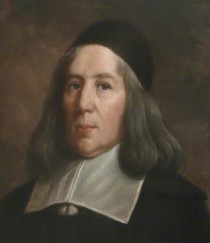
George Newton (1602-81) prepared for the ministry at Oxford (M.A.), and became minister at St Mary Magdalene Church, Taunton, Somerset, in 1631. His long and successful ministry was attended with many difficulties and was nearly ended in 1633 when Charles I ordered all clergy to read a directive authorising sports on the Lord’s Day. Newton obeyed the order but, having read it, he continued, ‘These are the commandments of men; now let us hear what be the commandments of God.’ He then opened the Bible, read the fourth commandment and said: ‘Thus, my brethren, ye have two ways set before you; it is for you to choose in which of these ways ye will walk.’
During the Civil War, Newton was forced to leave Taunton for a time and it was in the more peaceful years which followed that he preached the memorable series of sermons on John 17, published by the Trust (George Newton on John 17). From 1655 his assistant was Joseph Alleine who has subsequently become better known than his senior colleague on account of his book An Alarm to the Unconverted (published by the Trust under the title A Sure Guide to Heaven). Both men were removed from their charge and homes by the Act of Uniformity in 1662 and, refusing to be silenced, both were to suffer imprisonment.
An inscription in his church says (in Latin): ‘Here also lieth the body of GEORGE NEWTON, M.A. Who died the 12th of June, 1681, in the 79th year of his age, after he had faithfully discharged the duty of an evangelist for 50 years. Sprinkle not this sad tomb with feigned tears, For it covers the bones of your pious pastor; Who chastised your offences with a salutary scourge, While he raised the hearts which were pressed down with a sense of sin. He hath finished his task, and having received a holy reward, Now shines, like a glittering star, in the kingdom of heaven.’
[The author image is from a painting of Newton by Gustavus Ellinthorpe Sintzenich, by kind permission of Mansfield College, Oxford.]